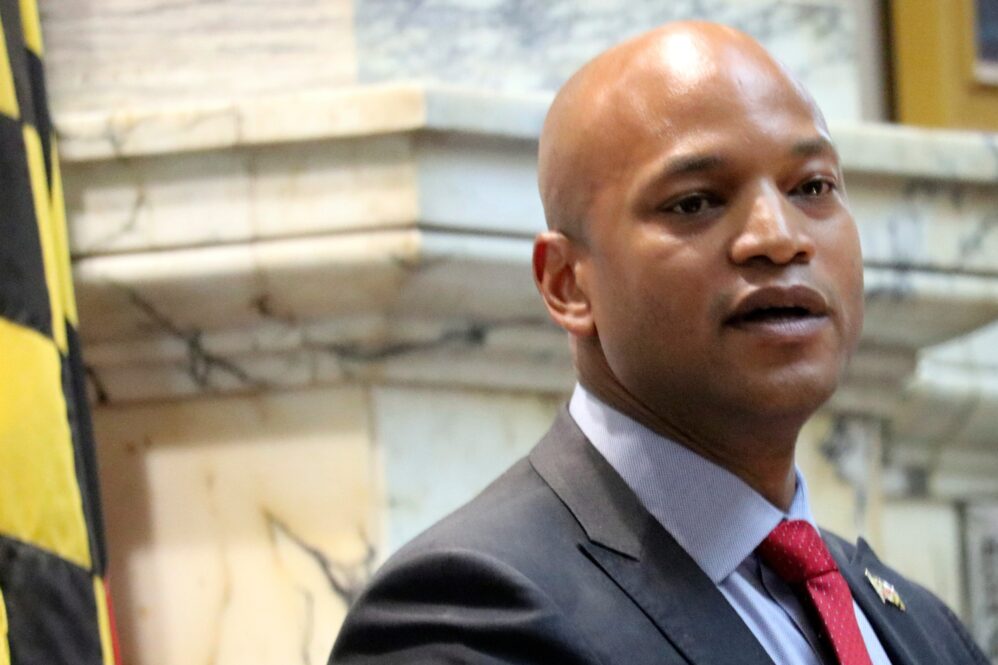CENTER MARYLAND: Gov. Wes Moore will advocate next session for state and private employers to practice preferential hiring for military spouses and for the state to offer more military leave to its employees serving in the National Guard or reserves.
At a news conference Wednesday at the State House, Moore also proclaimed 2024 as “the year for military families.”
The policies are the first that Moore, a Democrat heading into his second year in office, has unveiled as part of his legislative agenda for the 90-day session that begins Jan. 10. He’s expected to sponsor around a dozen bills.
“(Military spouses) have to jump from job to job, not because the job isn’t good and not because they’re not good at it. It’s because the county asked them to,” Moore, a former Army paratrooper captain, said during the news conference.
Maryland currently has preferential hiring for veterans, though not for their spouses.
Moore’s proposal would offer private employers the option to increase consideration for military spouses when hiring, though it wouldn’t mandate the practice.
Public sector employers would be required to grant military spouses “strong consideration” during the application process.
The state government often makes hires based on a points system, and military spouses applying for a state job would automatically receive additional points, Moore said.
“It doesn’t guarantee you’ll get hired, it just helps to level the playing field,” Moore said. “It makes sure that you are seen and supported, and it makes sure that your resume actually reflects the service and the sacrifice that you have already made to this country.”
Maryland offers 15 days of military leave, and 15 days of disaster service leave, to state employees in the National Guard or the reserves. The limited leave time, Moore said, has prompted service members to use their regular PTO for their armed forces obligations.
Moore said that expanding to 30 days the allocations for both military leave and disaster service leave will ensure that service members working for the state can use their PTO for family time, rather than for military drills.
The governor proposed bills to benefit military families and veterans last session, too.
Earlier this year, he signed into law income tax breaks for veterans. He also proposed granting free health care and dental care to Maryland National Guard members and their families, but lawmakers in the Democrat-led legislature passed a scaled-back reimbursement program.
The governor has still called the program a “pathway” to free health care and dental care for National Guard members.
Joining the governor Wednesday was state Sen. Dawn Gile, an Anne Arundel County Democrat who is pushing for the state to make it illegal for employers to not hire individuals because of their status as military service members, or the spouse or dependent of one, making them prone to regular moves every three years.
Gile, whose husband retired last year after 24 years of active duty service in the Army, said she’s spent her career facing the “formidable challenge” of establishing herself as an attorney while recognizing that the demands of the military always take priority.
“Military spouses are proud to stand alongside their service member, but they also care deeply about their own purpose and identity in their careers,” Gile said during the press conference.
Frequent moves leave military spouses looking for employment while at the bottom of day care wait lists upon arriving in a new state, Gile said.
She said she’s heard stories of spouses who’ve faced skepticism in job interviews because of their scattered work history, prompting questions of how long they’d even be at the job and leaving them without a call back.
Among other proposals targeting military service members and veterans, the Department of Veterans Affairs will sponsor a bill to waive fees for license plates belonging to family members of service members who died while in active duty.
Gold Star families, unlike certain veterans and their spouses, aren’t currently eligible for the waivers because of their special registration plates, which include a family member’s name and rank.










